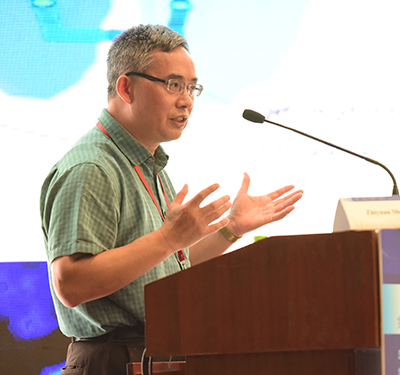 Zhiyuan Shen, MD, PhD
Zhiyuan Shen, MD, PhD
Professor, Division of Radiation Cancer Biology
Chief, Division of Radiation Cancer Biology
Department of Radiation Oncology
Associate Director for Basic Research
Rutgers Cancer Institute
Dr. Zhiyuan Shen is a Professor and the Division Chief of Radiation Cancer Biology in the Department of Radiation Oncology, and a Professor in the Department of Pharmacology, at the Rutgers Robert Wood Johnson Medical School. He serves as the Associate Director for Basic Research at the Rutgers Cancer Institute (CINJ). Dr. Shen received a medical degree from the Norman Bethune University of Medical Sciences (now merged with Jilin University, China) in 1985, and a PhD degree in Molecular Biology and Radiation Biology from Colorado State University in 1993. After completing a Director’s Postdoctoral Fellowship at the Los Alamos National Laboratory, he became a tenure tracked Assistant Professor at the University of Illinois at Chicago (1997), and at University of New Mexico (2000) where he was promoted to Associate Professor with tenure in 2003. In 2006, Dr. Shen was recruited to CINJ and Robert Wood Johnson Medical School as the inaugural chief of the newly formed Division of Radiation Cancer Biology within the Department of Radiation Oncology, and he was promoted to tenured Professor in 2008. Dr. Shen served as a co-leader of the Genomic Instability and Cancer Genetics research program of CINJ between 2008 and 2022, and he became the Associate Director for Basic Research in 2022.
Dr. Zhiyuan Shen has a longstanding interest in the mechanisms by which genomic instability is provoked and how it drives tumorigenesis. His PhD research identified and cloned the mouse cytochromes p450-1b1 gene (Proc Natl Acad Sci USA 1993, DNA Cell Biol 1994). His postdoctoral woks had led to the identifications of mammalian RAD52 (Genomics 1995), RAD52-RAD51 interaction (J Biol Chem 1996), UBL1/SUMO1 (Genomics 1996), and UBE2I/UBC9 (Genomics 1996). Since becoming an independent investigator in 1997, his research has focused on the etiological role of the BRCA1 and BRCA2 network in various forms of human cancers, particularly on a previously uncharacterized protein, BCCIP, which was initially identified as a BRCA2 and CDKN1A (p21) Interacting Protein. Works from his laboratory suggest that BCCIP plays critical roles in maintaining genomic integrity and regulation of ribosome biogenesis and cell proliferation. Recently, Dr. Shen has devoted a significant effort to establish unique mouse models and genomic approaches to reveal new mechanisms by which caretaker genes maintain genomic integrity and suppress tumorigenesis (see Research Overview and Publications for details).

